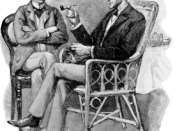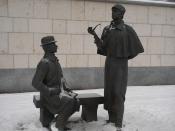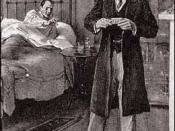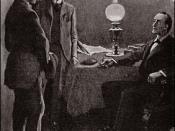Between the two main characters in the adventures of Holmes and Dr. Watson, Holmes is the logical and analytical side of their partnership, while Dr. Watson is the almost classic companion that tries to be like Holmes but just doesn't have his unique qualities that define him as a detective. Watson's struggles are very intriguing; while Watson takes appreciation in emotion and romance, Holmes concentrates on the solid facts, mentally blocking out the irrelevant. Holmes is analytical and compromising investigation versus Watson's romantic and descriptive mind, and Holmes is very thorough and precise in comparison to Watson's carelessness. Although these two characters are best described as opposites, when they work together, their success is uncanny.
Holmes' analytical and objective mind is by far one of the most distinct of Holmes' qualities. Unlike other detectives, things as trivial as emotion and incomplete understanding do not handicap his judgement. The last chapter, "A Retrospection", is a perfect example of this.
He retells the case from his point of view, and does not include any of his personal thoughts whatsoever. He overlooks the factors and variables even before he draws a definite conclusion; "presuming all our conjectures are correct - " (Watson)[137]"I presume nothing." (Holmes) [137]. His mind manages to stymie assumptions and suppress judgment based on his own understanding.
Watson's subjectivity and romance forces his mind to dwell on the emotion and detail of the world around him. When he first catches sight of the moor, he writes: "Over the green squares of fields⦠there rose in the distance a grey, melancholy hill with a jagged stone summitâ¦"[59]. He describes what he witnesses exactly as it appears to him in his mind; "A cold wind swept down⦠On that desolate plain⦠in a burrow like a wild beast... Heart full of malignancy..."[61]. He goes into great detail about how he imagines the moor and the convict who is hiding in the moor. Someone not as descriptive as Watson (I imagine) would describe the moor as "somewhat dull or boring". In comparison, Watson is much more in depth of what he is taking in.
As the "sidekick" of Holmes, it is a classic quality for him to be, straightforwardly, a klutz. In the case of "The Hound of the Baskervilles", this much is obvious when Watson is preparing an ambush for who is actually Holmes hiding out in the Neolithic hut, Holmes is already aware of his presence before he even entered the hut: "My dear Watson... I think you will be more comfortable outside than in." [128]. This takes Watson totally aback, as he was under the illusion that he was totally concealed when in fact he had made it obvious to anyone near enough to the hut that he was hiding: "I had no idea that you found my occasional retreat⦠until I was within twenty pace of the door.[128]. Watson, in his bewilderment asks: "my footprint, I presume?" Holmes amusedly responds: "I could not undertake to recognize your footprint amid all the footprints in the world... If you desire to deceive me you must change your tobacconist, for when I see the stub of a cigarette marked Bradley, Oxford Street, I know that my friend Watson is in the neighborhood." This shows that Watson is in fact careless enough to leave his still hot cigarette stub in the immediate vicinity of where he is setting up his ambush. This would easily alert a mind as aware as Holmes' or as paranoid as the convict's as to his hiding.
Holmes, on the other hand, is cautious and oversees all possible implications. In "The Hound of the Baskervilles", he even deceives his most loyal companion in order to solve the case; "My dear fellow, you have been invaluable to me in this.. I beg that you will forgive me if I have seemed to play a trick on you⦠Had I been with Sir Henry and you it is evident my point of view would have been the same as yours, and my presence would have informed our very formidable opponents to be on their guard. As it is, I have been able to get about as I could not possibly have done had I been living in the hall, and I remain an unknown factor in the business, ready to throw my weight at a critical moment." (130). In order to stay covert, he deceived everyone based on the caution of not alerting their enemy. He 'plans ahead', if you will, and takes all thing into consideration and acts accordingly.
Despite their major and obvious differences, they still manage to work prodigiously and efficiently in solving mysteries. This is because they correspond to each other. For everywhere Sherlock Holmes isn't, Watson is. So, Watson is more emotional and empathetic, this makes it easier for him to communicate and interact with the people around him. This also makes him, although not perfect, an ideal character for a cover of a seemingly innocent and unassuming man. Whereas Watson is more easily sociable, even though he likes to think himself capable, Holmes is the real mastermind behind the pair. Even though he can't effectively investigate undercover due to his fame and rather interrogating nature, he can still watch from a distance and work out facts from rumor. As investigators, one cannot work without the other. Holmes would not be able to glean enough evidence without Watson, and Watson would not be able to deduce accurate and presentable cases without Holmes.
Doyle, Aurthur Conan. The Hound of the Baskervilles. N.p.: n.p., 1902. Print.





